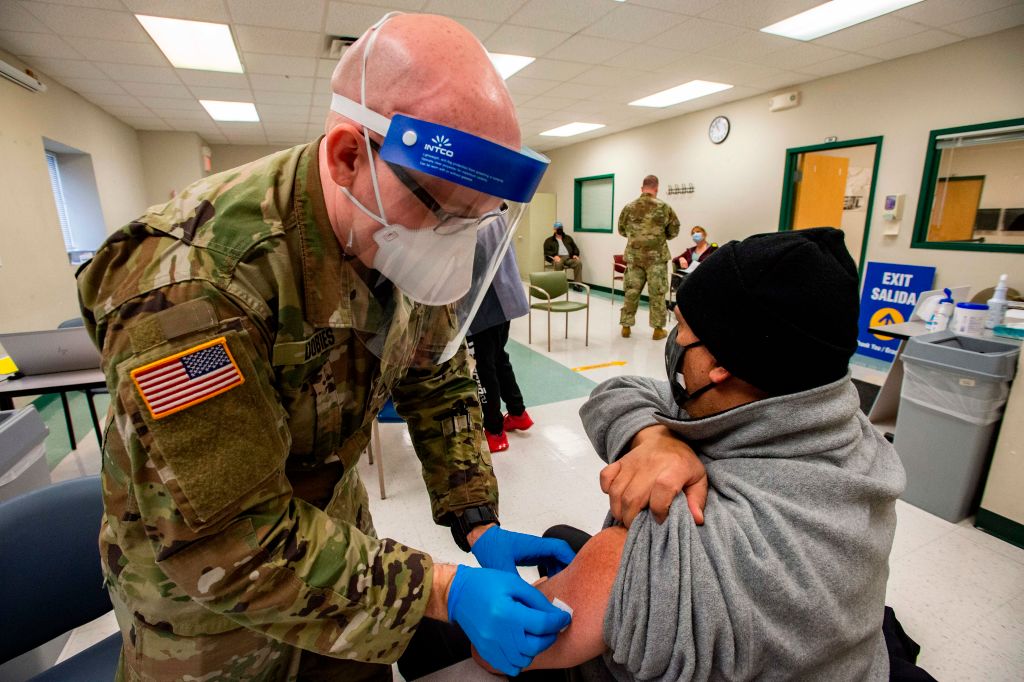The COVID-19 vaccines are proving incredibly effective. Here's why experts are downplaying the success.


A free daily email with the biggest news stories of the day – and the best features from TheWeek.com
You are now subscribed
Your newsletter sign-up was successful
Another study released Monday underscored the remarkable effectiveness of the COVID-19 vaccines. Public health experts in Scotland examined data on all 5.4 million residents of Scotland, including the million-plus who had received the first dose of the Pfizer-BioNTech or Oxford-AstraZeneca vaccine, and found that getting the first dose reduced the risk of hospitalization by up to 85 percent and 94 percent, respectively, after four weeks — even as a new, more transmissible variant became dominant.
The Scottish study has not yet been peer-reviewed, but it matches findings from Israel and elsewhere that in the real world, the COVID-19 vaccines are proving incredibly good at preventing serious infections, hospitalization, and death, apparently even transmission. Still, the message a lot of people hear about the vaccines, David Leonhardt argues in The New York Times, is that "the coronavirus vaccines aren't 100 percent effective. Vaccinated people may still be contagious. And the virus variants may make everything worse. ... The vaccine is not a get-out-of-COVID-free card!"
That type of "vaccine alarmism" is grounded in technical truths but "fundamentally misleading," Leonhardt writes, and it's feeding the sizable share of Americans who say they would turn down a vaccine "partly because it sounds so ineffectual." So what's getting lost in translation?
The Week
Escape your echo chamber. Get the facts behind the news, plus analysis from multiple perspectives.

Sign up for The Week's Free Newsletters
From our morning news briefing to a weekly Good News Newsletter, get the best of The Week delivered directly to your inbox.
From our morning news briefing to a weekly Good News Newsletter, get the best of The Week delivered directly to your inbox.
"Many academic experts — and, yes, journalists too — are instinctively skeptical and cautious," Leonhardt says. In their own lives, "many are getting shots as soon as they're offered one. They are urging their family and friends to do the same. But when they speak to a national audience, they deliver a message that comes off very differently. It is dominated by talk of risks, uncertainties, caveats, and possible problems."
Dr. Anthony Fauci, the top U.S. infectious disease expert, said on CNN Sunday that "we will be approaching a degree of normality" in the fall, but the headlines note he also said it's "possible" people may still have to wear face masks in 2022.
Public health experts do genuinely disagree about where we are in the pandemic and what lies ahead. But when it comes to the vaccines, there's broad agreement. All seven vaccines that have undergone large trials "appear to be 100 percent effective for serious complications," a group of prominent public health experts wrote in a USA Today op-ed last week. "The best thing you can do is get vaccinated as soon as you're able with whichever vaccine is available to you first."
A free daily email with the biggest news stories of the day – and the best features from TheWeek.com
Peter has worked as a news and culture writer and editor at The Week since the site's launch in 2008. He covers politics, world affairs, religion and cultural currents. His journalism career began as a copy editor at a financial newswire and has included editorial positions at The New York Times Magazine, Facts on File, and Oregon State University.
-
 Buddhist monks’ US walk for peace
Buddhist monks’ US walk for peaceUnder the Radar Crowds have turned out on the roads from California to Washington and ‘millions are finding hope in their journey’
-
 American universities are losing ground to their foreign counterparts
American universities are losing ground to their foreign counterpartsThe Explainer While Harvard is still near the top, other colleges have slipped
-
 How to navigate dating apps to find ‘the one’
How to navigate dating apps to find ‘the one’The Week Recommends Put an end to endless swiping and make real romantic connections
-
 Trump HHS slashes advised child vaccinations
Trump HHS slashes advised child vaccinationsSpeed Read In a widely condemned move, the CDC will now recommend that children get vaccinated against 11 communicable diseases, not 17
-
 FDA OKs generic abortion pill, riling the right
FDA OKs generic abortion pill, riling the rightSpeed Read The drug in question is a generic version of mifepristone, used to carry out two-thirds of US abortions
-
 RFK Jr. vaccine panel advises restricting MMRV shot
RFK Jr. vaccine panel advises restricting MMRV shotSpeed Read The committee voted to restrict access to a childhood vaccine against chickenpox
-
 Texas declares end to measles outbreak
Texas declares end to measles outbreakSpeed Read The vaccine-preventable disease is still spreading in neighboring states, Mexico and Canada
-
 RFK Jr. shuts down mRNA vaccine funding at agency
RFK Jr. shuts down mRNA vaccine funding at agencySpeed Read The decision canceled or modified 22 projects, primarily for work on vaccines and therapeutics for respiratory viruses
-
 Measles cases surge to 33-year high
Measles cases surge to 33-year highSpeed Read The infection was declared eliminated from the US in 2000 but has seen a resurgence amid vaccine hesitancy
-
 Kennedy's vaccine panel signals skepticism, change
Kennedy's vaccine panel signals skepticism, changeSpeed Read RFK Jr.'s new vaccine advisory board intends to make changes to the decades-old US immunization system
-
 Kennedy ousts entire CDC vaccine advisory panel
Kennedy ousts entire CDC vaccine advisory panelspeed read Health Secretary RFK Jr. is a longtime anti-vaccine activist who has criticized the panel of experts
